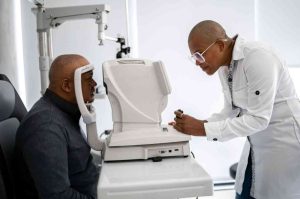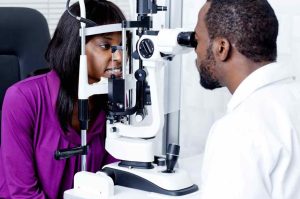
Autoimmune diseases are disorders in which the immune system attacks the body’s tissues, causing inflammation and damage. Some of the most common autoimmune diseases include rheumatoid arthritis, lupus, Sjogren syndrome, and sarcoidosis. These diseases can affect various organs and systems, including the eyes. Ocular manifestations of autoimmune diseases can range from mild symptoms such as dry eyes and conjunctivitis to severe complications such as optic neuritis, uveitis, and retinal vasculitis, which can lead to vision loss or blindness.
In Nigeria, the prevalence and impact of autoimmune diseases and their ocular complications are not well documented. However, some studies have reported that autoimmune diseases account for 5.6% of all cases of uveitis, and 9.4% of all cases of optic neuropathy in Nigerian patients. Moreover, autoimmune diseases are more common in women than in men and tend to affect people’s reproductive age, posing significant challenges to their quality of life and socioeconomic status. Therefore, there is a need for more awareness, diagnosis, and management of autoimmune diseases and their ocular manifestations in Nigeria, as well as more research on the epidemiology, risk factors, and outcomes of these conditions.

Understanding Autoimmune Diseases and Their Impact on Vision
Autoimmune diseases occur when the immune system mistakenly attacks healthy cells and tissues in the body.
The eyes are a common target for autoimmune diseases, leading to various vision problems.
Autoimmune diseases can affect different parts of the eye, including the cornea, retina, and optic nerve.
Vision loss in autoimmune diseases can range from mild to severe, depending on the specific condition and its progression.
Common Autoimmune Diseases Leading to Vision Loss
Some common autoimmune diseases that can lead to vision loss include rheumatoid arthritis, lupus, multiple sclerosis, and uveitis.
These diseases can cause inflammation and damage to the eye structures, resulting in vision problems.
Each autoimmune disease uniquely affects the eye, leading to specific symptoms and complications.
Early detection and treatment are vital in preventing permanent vision loss.
The Prevalence of Vision Loss in Nigeria Due to Autoimmune Diseases
In Nigeria, autoimmune diseases contribute significantly to vision loss and blindness. The exact prevalence of autoimmune-induced vision loss in Nigeria is unknown, but it is believed to be substantial. Limited resources and access to healthcare services make it challenging for individuals with autoimmune diseases to receive timely and appropriate eye care. There is a need for increased awareness, screening programs, and specialized services for managing autoimmune-related vision problems in Nigeria.
Recognizing Early Signs of Vision Loss in Autoimmune Diseases
Early detection of vision loss in autoimmune diseases is crucial for preventing further damage and preserving visual function. Here are some common early signs to watch out for:
- Blurred vision: Objects may appear fuzzy or out of focus.
- Eye pain: Discomfort or aching in or around the eye.
- Redness: The eyes may appear bloodshot or irritated.
- Sensitivity to light: Bright lights may cause discomfort or difficulty seeing.
- Difficulty seeing at night: Decreased ability to see in low-light conditions.
It is important to remember that these symptoms may vary depending on the specific autoimmune disease. If you experience any changes in your vision, it is essential to report them promptly to your healthcare provider. Regular eye exams can help catch problems early and allow for timely intervention and treatment.

Diagnosing and Managing Autoimmune-Related Vision Problems
Diagnosing autoimmune-related vision problems involves a comprehensive eye examination, medical history review, and specialized tests. An ophthalmologist will carefully assess the individual’s symptoms, conduct a thorough examination of the eye structures, and review their medical history for any autoimmune conditions.
Specialized tests may include:
- Visual acuity test: Measures how well an individual can see at various distances
- Slit-lamp examination: Allows the ophthalmologist to examine the structures at the front of the eye, such as the cornea and iris
- Fundus examination: Provides a detailed view of the back of the eye, including the retina and optic nerve
- Optical coherence tomography (OCT): Produces cross-sectional images of the retina to detect any abnormalities
- Fluorescein angiography: Involves injecting a dye into the arm to obtain high-quality images of the blood vessels in the retina
Once a diagnosis is made, the treatment for autoimmune-related vision problems aims to control inflammation, preserve visual function, and manage the underlying autoimmune disease. This usually involves a combination of medications and careful monitoring.
Immunosuppressive medications, such as corticosteroids or immunomodulatory drugs, may be prescribed to reduce autoimmune activity and prevent further damage to the eyes. These medications work by suppressing the immune system to reduce inflammation and target the autoimmune response.
In some cases, corticosteroid eye drops or ointments may be used topically to target inflammation directly in the eye. Additionally, biologic therapies, which are genetically engineered proteins, can be used to target specific molecules involved in the autoimmune response.
Regular follow-up visits with an ophthalmologist are essential to monitor the progress of the condition and adjust the treatment plan, if necessary. These visits also allow for the detection of any potential complications or side effects from the medications being used.
Effective Treatments for Autoimmune-Induced Vision Loss
The treatment options for autoimmune-induced vision loss depend on the specific condition and its severity. Medications, such as immunosuppressants, corticosteroids, and biologics, may be prescribed to manage autoimmune activity and minimize eye damage. Surgical interventions, such as corneal transplants or retinal surgeries, may be necessary in advanced cases. Vision rehabilitation programs can help individuals adapt to any remaining vision loss and enhance their quality of life.

Preventing Vision Loss Caused by Autoimmune Diseases
Preventing vision loss caused by autoimmune diseases involves early detection, timely treatment, and proactive management of the underlying autoimmune condition.
Regular eye exams, even in the absence of symptoms, can help identify any early signs of eye problems and initiate appropriate interventions.
Maintaining a healthy lifestyle, including a balanced diet and regular exercise, may also support overall eye health and minimize the risk of vision loss.
Education and awareness programs can empower individuals with autoimmune diseases to be proactive in protecting their eyesight and seeking necessary care.

Improving Awareness and Support for Individuals with Autoimmune-Related Vision Loss
There is a need for increased awareness about the connection between autoimmune diseases and vision loss, especially in Nigeria. Educational campaigns, community outreach programs, and collaborations between healthcare professionals and advocacy groups can help raise awareness and support for individuals with autoimmune-related vision loss.
Access to affordable and specialized eye care services should be prioritized to ensure timely diagnosis, treatment, and management of vision problems. Support networks and resources for individuals with autoimmune-related vision loss can provide valuable emotional support, information, and guidance throughout their journey.
Conclusion
In conclusion, autoimmune diseases can have a significant impact on vision, leading to various vision problems and potential vision loss. In Nigeria, where resources for healthcare may be limited, it is crucial to increase awareness and support for individuals with autoimmune-related vision loss. Early detection, timely treatment, and proactive management of the underlying autoimmune condition are essential in preventing further damage and preserving visual function. Regular eye exams, maintaining a healthy lifestyle, and seeking necessary care can help individuals protect their eyesight. By improving awareness, access to specialized eye care services, and providing support networks, we can enhance the quality of life for those affected by autoimmune-related vision loss in Nigeria.
